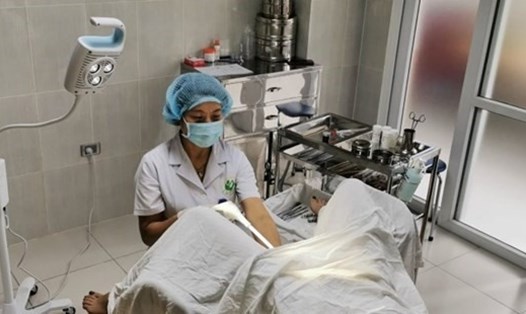Dr. CKI Nguyen Phu An - Department of Clinical Medicine 3, Ho Chi Minh City Dermatology Hospital said that chicken breast is caused by HPV virus (Human papilloma virus), characterized by benign papilloma damage in the genitals, groin, anus and around the mouth. Of the more than 100 HPV strains, Types 6 and 11 account for 90% of chickenpox cases. Some high-risk types such as 16, 18, 31, 33 can lead to cervical, penis or anorectal cancer.
Most people infected with HPV do not have obvious symptoms and eliminate the virus themselves within two years. However, in some cases, HPV develops into small, soft lumps, growing individually or in clusters, which can be rough or cauliflower, appearing at the sexual contact location. These nodules can self-dehong or increase in size if left untreated.
HPV is mainly transmitted through skin contact, when having sex through the vaginal canal, anus or mouth. People infected with the disease can transmit the virus even if they do not have symptoms. In addition, the virus can also be transmitted through small scratches on the skin, sharing personal items such as towels, underwear, or sex toys.
If not intervened early, chicken breast can develop into large lumps, causing pain, bleeding, and even blockage of the genitals. Some cases of high-risk HPV infection can lead to cervical cancer, penis or pharyngitis.
For pregnant women, large lumps can cause infertility and are more rare than breast cancer in infants.
There is currently no method to completely destroy HPV. Treatment focuses on removing pimples and controlling recurrence. The methods include: surgery, electric burning, laser, cold circulation or use topical immunostimulators (Imiquimod, sidnecatechin...). After treatment, the disease is still at risk of recurring if the immune system is weak or continues to be exposed to the source of infection.
According to Dr. Nguyen Phu An, in addition to treatment, strengthening resistance with a reasonable diet, regular physical and mental exercise plays a key role in long-term disease control.
The HPV vaccine is considered an effective disease prevention measure, recommended for both men and women aged 9 to 45, helping to protect against the 9 most common HPV strains. Using condoms during sex, being loyal to one wife and one husband and avoiding sexual acts that damage the lining also helps reduce the risk of infection.
In addition, regular health checks help detect pre-cancer damage early, thereby preventing serious consequences.








